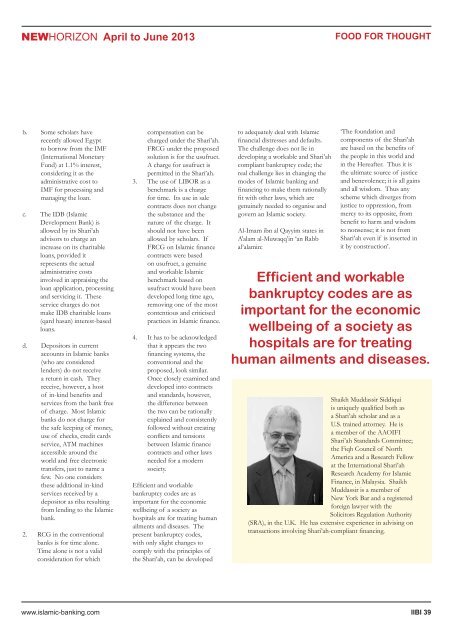NEWHORIZON
NEWHORIZON - Institute of Islamic Banking and Insurance
NEWHORIZON - Institute of Islamic Banking and Insurance
- No tags were found...
Create successful ePaper yourself
Turn your PDF publications into a flip-book with our unique Google optimized e-Paper software.
<strong>NEWHORIZON</strong> April to June 2013<br />
FOOD FOR THOUGHT<br />
b. Some scholars have<br />
recently allowed Egypt<br />
to borrow from the IMF<br />
(International Monetary<br />
Fund) at 1.1% interest,<br />
considering it as the<br />
administrative cost to<br />
IMF for processing and<br />
managing the loan.<br />
c. The IDB (Islamic<br />
Development Bank) is<br />
allowed by its Shari’ah<br />
advisors to charge an<br />
increase on its charitable<br />
loans, provided it<br />
represents the actual<br />
administrative costs<br />
involved in appraising the<br />
loan application, processing<br />
and servicing it. These<br />
service charges do not<br />
make IDB charitable loans<br />
(qard hasan) interest-based<br />
loans.<br />
d. Depositors in current<br />
accounts in Islamic banks<br />
(who are considered<br />
lenders) do not receive<br />
a return in cash. They<br />
receive, however, a host<br />
of in-kind benefits and<br />
services from the bank free<br />
of charge. Most Islamic<br />
banks do not charge for<br />
the safe keeping of money,<br />
use of checks, credit cards<br />
service, ATM machines<br />
accessible around the<br />
world and free electronic<br />
transfers, just to name a<br />
few. No one considers<br />
these additional in-kind<br />
services received by a<br />
depositor as riba resulting<br />
from lending to the Islamic<br />
bank.<br />
2. RCG in the conventional<br />
banks is for time alone.<br />
Time alone is not a valid<br />
consideration for which<br />
compensation can be<br />
charged under the Shari’ah.<br />
FRCG under the proposed<br />
solution is for the usufruct.<br />
A charge for usufruct is<br />
permitted in the Shari’ah.<br />
3. The use of LIBOR as a<br />
benchmark is a charge<br />
for time. Its use in sale<br />
contracts does not change<br />
the substance and the<br />
nature of the charge. It<br />
should not have been<br />
allowed by scholars. If<br />
FRCG on Islamic finance<br />
contracts were based<br />
on usufruct, a genuine<br />
and workable Islamic<br />
benchmark based on<br />
usufruct would have been<br />
developed long time ago,<br />
removing one of the most<br />
contentious and criticised<br />
practices in Islamic finance.<br />
4. It has to be acknowledged<br />
that it appears the two<br />
financing systems, the<br />
conventional and the<br />
proposed, look similar.<br />
Once closely examined and<br />
developed into contracts<br />
and standards, however,<br />
the difference between<br />
the two can be rationally<br />
explained and consistently<br />
followed without creating<br />
conflicts and tensions<br />
between Islamic finance<br />
contracts and other laws<br />
needed for a modern<br />
society.<br />
Efficient and workable<br />
bankruptcy codes are as<br />
important for the economic<br />
wellbeing of a society as<br />
hospitals are for treating human<br />
ailments and diseases. The<br />
present bankruptcy codes,<br />
with only slight changes to<br />
comply with the principles of<br />
the Shari’ah, can be developed<br />
to adequately deal with Islamic<br />
financial distresses and defaults.<br />
The challenge does not lie in<br />
developing a workable and Shari’ah<br />
compliant bankruptcy code; the<br />
real challenge lies in changing the<br />
modes of Islamic banking and<br />
financing to make them rationally<br />
fit with other laws, which are<br />
genuinely needed to organise and<br />
govern an Islamic society.<br />
Al-Imam ibn al Qayyim states in<br />
A’alam al-Muwaqq’in ‘an Rabb<br />
al’alamin:<br />
‘The foundation and<br />
components of the Shari’ah<br />
are based on the benefits of<br />
the people in this world and<br />
in the Hereafter. Thus it is<br />
the ultimate source of justice<br />
and benevolence; it is all gains<br />
and all wisdom. Thus any<br />
scheme which diverges from<br />
justice to oppression, from<br />
mercy to its opposite, from<br />
benefit to harm and wisdom<br />
to nonsense; it is not from<br />
Shari’ah even if is inserted in<br />
it by construction’.<br />
Efficient and workable<br />
bankruptcy codes are as<br />
important for the economic<br />
wellbeing of a society as<br />
hospitals are for treating<br />
human ailments and diseases.<br />
Shaikh Muddassir Siddiqui<br />
is uniquely qualified both as<br />
a Shari’ah scholar and as a<br />
U.S. trained attorney. He is<br />
a member of the AAOIFI<br />
Shari’ah Standards Committee;<br />
the Fiqh Council of North<br />
America and a Research Fellow<br />
at the International Shari’ah<br />
Research Academy for Islamic<br />
Finance, in Malaysia. Shaikh<br />
Muddassir is a member of<br />
New York Bar and a registered<br />
foreign lawyer with the<br />
Solicitors Regulation Authority<br />
(SRA), in the U.K. He has extensive experience in advising on<br />
transactions involving Shari’ah-compliant financing.<br />
www.islamic-banking.com IIBI 39
















